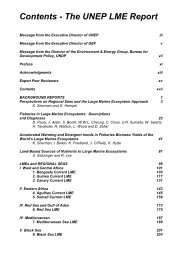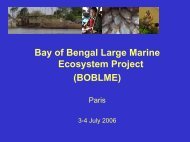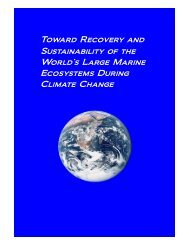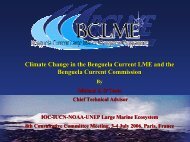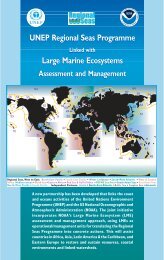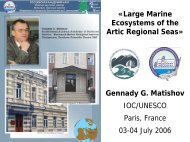Sustaining the World's Large Marine Ecosystems
Sustaining the World's Large Marine Ecosystems
Sustaining the World's Large Marine Ecosystems
Create successful ePaper yourself
Turn your PDF publications into a flip-book with our unique Google optimized e-Paper software.
describing practical applications of <strong>the</strong> LME approach to recover and sustain<br />
depleted and degraded marine goods and services.<br />
Global LME Movement<br />
<strong>Sustaining</strong> <strong>the</strong> World’s <strong>Large</strong> <strong>Marine</strong> <strong>Ecosystems</strong>, provides examples of<br />
advances made in <strong>the</strong> operationalization of <strong>the</strong> five-module approach to<br />
ecosystem based management (EBM) for sustaining <strong>the</strong> goods and services of<br />
<strong>the</strong> world’s LMEs. The opening contribution by A. Duda is focused on <strong>the</strong> global<br />
movement underway by <strong>the</strong> LME partners (GEF, UNEP, UNDP, UNIDO, IOC-<br />
UNESCO,FAO, NOAA, IUCN and WWF) to assist over 100 developing countries<br />
in operationalizing <strong>the</strong> LME approach to <strong>the</strong> assessment and management of<br />
coastal ocean goods and services. The following chapter, by Sherman et al.,<br />
describes <strong>the</strong> suites of indicators used to monitor and assess changing states of<br />
LMEs in support of ecosystem-based adaptive management practices. The<br />
subsequent contributions are focused on <strong>the</strong> results of initial phases of fully<br />
operationalized LME projects. In <strong>the</strong> case of <strong>the</strong> Benguela Current LME, M.<br />
O’Toole describes <strong>the</strong> emergence of <strong>the</strong> world’s first LME governance<br />
Commission. In his chapter, he summarizes <strong>the</strong> present institutional structures,<br />
future plans, and lessons learned from ten years of engagement by Angola,<br />
Namibia, and South Africa in operationalizing <strong>the</strong> LME approach to address<br />
specific transboundary priorities of <strong>the</strong> Benguela Current LME project based on<br />
<strong>the</strong> countries’ agreed upon Transboundary Diagnostic Analysis (TDA) and<br />
Strategic Action Program (SAP).<br />
LME Project Applications<br />
In <strong>the</strong> Baltic Sea LME (BSLME) project chapter, J. Thulin describes <strong>the</strong><br />
application of <strong>the</strong> 5-module LME approach for controlling nutrient overenrichment<br />
from improved agricultural practices in partnership with <strong>the</strong> WWF and<br />
<strong>the</strong> Helsinki Commission (HELCOM). With regard to fisheries sustainability, he<br />
explains how <strong>the</strong> BSLME project enhanced <strong>the</strong> application of <strong>the</strong> ecosystembased<br />
approach to initiate recovery of depleted fish stocks of <strong>the</strong> BSLME through<br />
activities of working groups of <strong>the</strong> International Council for <strong>the</strong> Exploration of <strong>the</strong><br />
Sea (ICES) and supported by GEF funds to allow for greater participation in <strong>the</strong><br />
project by emerging democratic countries of <strong>the</strong> eastern Baltic.<br />
Q. Tang, addresses <strong>the</strong> application of time-series metrics for investigating multidecadal<br />
changing states of <strong>the</strong> Yellow Sea LME (YSLME). Results of <strong>the</strong><br />
analyses of ecosystem productivity and ecosystem health are described in<br />
relation to environmental and anthropogenic ecosystem driving forces of change.<br />
He concludes <strong>the</strong> chapter with a description of an adaptive management<br />
approach to both recover depleted fisheries and improve <strong>the</strong> water quality of <strong>the</strong><br />
YSLME. A major effort to reduce fishing effort is selected as <strong>the</strong> strategy to<br />
recover depleted capture fishery stocks, while a parallel marine mariculture effort<br />
is to be ramped up to replace <strong>the</strong> estimated loss of capture fisheries biomass<br />
yields with intensive expansion of marine polyculture.<br />
v



